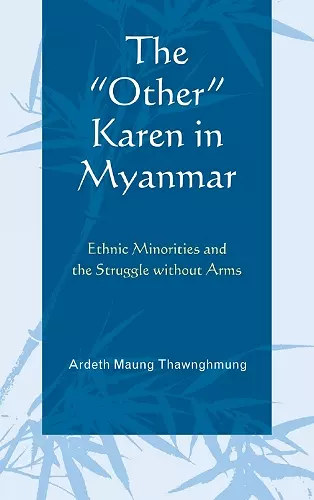The "Other" Karen in Myanmar
Ethnic Minorities and the Struggle without Arms
Ardeth Maung Thawnghmung author
Format:Hardback
Publisher:Lexington Books
Published:30th Dec '11
Currently unavailable, and unfortunately no date known when it will be back

The “Other” Karen in Myanmar looks at the “other” or “quiet” minorities, who are members of ethnic groups associated with well-known armed resistance organizations, but who pursued non-violent approaches to promote their individual and collective interests. This is the first in-depth study to uncover the existence and activities of the “other” Karen and analyze the nature of relationships with their “rebel” counterparts and the state authorities. It also discusses other ethnic armed organizations that have experienced similar situations and assesses their implications for inter-ethnic relations, negotiations with state authorities and political reform. Most previous studies have focused on violent aspects of ethnic relations and on ethnic armed organizations, such as the Karen National Union (KNU) in Burma, the Moro Islamic Liberation Front (MNLF) in the Philippines, and the LTTE in Sri Lanka. However, even among these minorities which are locked in armed conflicts, the majority of people have shunned armed resistance and sought to remain ‘quietly’ beyond the struggle and pursued non-violent approaches to promote their individual and collective interests in the face of authoritarian, governments. This study, which sheds light on the lives and growing political significance of non-armed, non-insurgent members of ethnic minorities in Burma, draws heavily on opinion surveys and open-ended interviews among Karen diaspora (among individuals who lived a minimum of 20 years in Burma), “quiet Karens” who live inside Burma, KNU officials, personnel, and soldiers, and Karen refugees and IDPs who are currently living in Thai-Burma border areas. These interviews, which covered approximately two hundred respondents, have been conducted since 2002. It is mainly directed toward social scientists, historians, humanitarian workers, policy makers, and practitioners, and non-specialist ordinary audience who are interested in Southeast Asian/Burmese politics and society, comparative politics, identity politics, ethnic conflict, social movements, conflict resolution, and political reform.
This study of the Karens of Burma has several strengths. First, an indigenous Karen who was educated initially in Myanmar/Burma and then abroad wrote it; today, she teaches political science in a US university. Second, Thawnghmung (Univ. of Massachusetts, Lowell) brings a new approach to the subject by concentrating on the Karen "others." Internal wars between the Karens and the state have been ongoing for more than six decades; however, the author's focus is on the Karens who have not joined in the fighting. As a result, the study is different from most of the writings about the second-largest minority in Burma. Third, she devotes a good deal of attention to a comparative discussion of the Karens and ethnic minorities in other countries around the world. Because of these differences from most of the literature on Burma and the Karens, this study is new and original. Moreover, it is well written and thoughtful and should find readers beyond the usual Burma and area specialists because it is placed in a comparative context that offers fresh ideas and information for political comparativists to consider. Summing Up: Recommended. * CHOICE *
Ardeth Maung Thawnghmung’s brave new book is a worthy successor to her penetrating Behind the Teak Curtain. In this second volume, she does more than recount the complexities of the Karen communities of Myanmar, but demonstrates through her use of comparative studies, the massive difficulties involved in trying to understand the nature of ethnic politics in a country as complicated as Myanmar. Those who naively seek simplistic answers to Myanmar’s myriad problems will learn much from this important book. Students of comparative ethnic politics will, as well. -- Robert H. Taylor, author of The State in Myanmar
This richly detailed and closely argued study is a major contribution to the literature on Burmese politics and social issues. Ardeth Maung Thawnghmung addresses an important and sensitive subject in a rigorous, yet balanced and nuanced manner. The book will be particularly useful to scholars and activists because most previous studies of the Karen community in and from Burma have focused on a well-connected, highly researched - but not necessarily representative - minority, engaged in political activities or living as displaced people along the Thailand border. While not seeking to marginalize such voices, Thawnghmung provides a necessary corrective. She combines a state-of-the-art theoretical orientation with grounded insights into the relationship between the diverse Karen community and the state of Myanmar. Her analysis is relevant to the situation of many 'other' restive communities around the world, and should thus be of interest both to Burma-watchers and to the broader scholarly and policy-orientated communities. -- Ashley South, author of Ethnic Politics in Burma: States of Conflict (2008)
This remarkable book portrays anti-government rebels and 'their' supporters; pro-government officials and 'their' supporters; pro-government people who become anti-government people; people just trying to stay out of the way; and people who go away, fleeing to hither and yon as refugees. Author Ardeth Maung Thawnghmung uses her extensive sources and her own experiences to reveal the complexities and predicaments of Karen people and others who live with and are caught up in ethnic conflicts spanning decades in Burma/Myanmar. -- Benedict Kerkvliet, Emeritus Professor, The Australian National University, Canberra, Australia
This is a meticulously researched and compelling analysis of the politics of the many Burmese Karen who are not engaged in a violent struggle with the government, but have found ways to accommodate themselves to the challenging realities of their circumstances. The author combines the fruits of several years extensive fieldwork with a refreshingly broad theoretical and comparative perspective. The result is an extremely distinctive and original book that allows us to understand Burma in new and much more nuanced ways. -- Duncan McCargo, professor of southeast Asian politics, University of Leeds
ISBN: 9780739168523
Dimensions: 240mm x 162mm x 21mm
Weight: 513g
232 pages